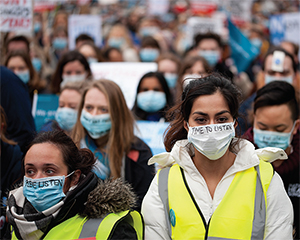
© John Gomez / shutterstock.com
Editor’s note: Physicians are increasingly frustrated with various regulations, requirements, and other activities that have impacted their satisfaction with the practice of medicine. They, and particularly those who are hospital or health system employees, feel that they are no longer in control of their destinies, and physician burnout is on the rise.The following article discusses the “nuclear option” of a physician strike, a proposition I and most others find incredibly repugnant. However, I think it is important that the subject to be discussed given the current environment.–Robert Miller, MD, Editor
Explore This Issue
February 2017
Junior doctors in the United Kingdom have spent several years fighting for a new contract with the British National Health Service (NHS). Four work stoppages—one-day strikes—took place in early 2016. Last fall, the plan was to ramp up the stoppages with longer-lasting actions. But the series of five-day strikes was called off due to concerns over patient safety, according to the BBC.
Should physicians, including otolaryngologists, be allowed to strike? A trio of experts told ENTtoday that the answer is more nuanced than a simple “yes” or “no.”
“As much as the role of the physician has evolved over the past few decades to become something more of a transactional relationship with patients, I think the vast majority of physicians would agree that they still have an ethical obligation to provide at least emergency services at all times,” said Ryan Hoskins, MPA, MD, a family and emergency department doctor in Canada who has written about physician strikes. “Doctors, however, should be allowed to conduct job action.”
Those actions shouldn’t involve “a full withdrawal of services,” but should recognize that physicians have the rights of workers in other fields that provide essential services, such as police and firefighters. “Like any other profession, they should have as a negotiating tool the ability to have some form of collective action if they feel they are mistreated,” he said. “But it is a decision that must be taken perhaps with more weight than in jobs outside of healthcare.”
Ethics 101
One of the first questions to ask about whether or not a physician can strike involves its impact on the Hippocratic oath. Even if the law says a physician can strike, his or her moral and ethical responsibilities to a patient must be paramount, said David Kemp, a lawyer who writes on medical ethics. “For physicians to ethically engage in organized work stoppage, they must first exhaust all other avenues of negotiation,” he says. “It’s my view that, due to the unique nature of the doctor–patient relationship, [physicians] must also take all necessary steps to safeguard the welfare of patients before engaging in any type of organized work stoppage.”
Echoing Dr. Hoskins’ idea, Kemp said that work stoppages by physicians must be carefully planned. “There can be no massive walk-out or broad refusal to do any work at all,” he said. “Without going into the details of how physicians might organize a strike, I would expect an ethical organized work stoppage at a large, multi-service hospital to involve coordination between departments where physician presence is essential for patient care and departments in which physicians provide primarily elective procedures. The purpose of organized work stoppage is to put administrative pressure on the employer without adversely affecting patient care.”
Kemp urges physicians to become familiar with the federal rules on work actions while also understanding state rules on organized job actions, as those tend to vary.
To Unionize or Not?
Before discussing whether or not a strike is viable, it’s important to note that without physician unions, job actions of any kind can be difficult to organize.
Pamela Wible, MD, a family physician from Eugene, Ore., who has developed a following as a TEDMED presenter and as a promoter of the “Ideal Medical Practice” movement that preaches patient-centeredness (idealmedicalcare.org), believes physicians should be able to strike. She also doesn’t believe a union is necessary. “When a group of people boycott an organization, a product, [or] a health system, the power is in the unity of the group,” Dr. Wible said. “They need not be represented by a traditional union. Obviously, some leadership within the group would be essential for negotiation and for group cohesion.”
Dr. Hoskins said that while structured organization can help, a work stoppage can be nearly impossible without a union. “Collective action is difficult to achieve, even in the most unionized environments,” he said. “It is certainly made more difficult in the scenario of physicians who, in most jurisdictions, do not form traditional unions.”
Dr. Hoskins has researched strikes across the globe and says the action is more frequent in health systems where government funds all or most healthcare costs, as with the NHS in Britain. The highest number of documented physician strikes is in Israel, where healthcare is fully paid for by the government.
Due to the unique nature of the doctor–patient relationship, [physicians] must take all necessary steps to safeguard the welfare of patients before engaging in any type of organized work stoppage. —David Kemp
Making It Work
If a group of otolaryngologists or other specialists did organize to the point of a work stoppage, how would it actually work? Well, as the athletic adage says, “Failing to prepare is preparing to fail”; the answer is in planning, Dr. Wible said. “Set a date,” she advised. “Plan for coverage of essential services. Involve the media, as the power in a strike often [comes from] bringing the nation together to converse on a topic of concern for the group that is striking.”

© John Gomez / shutterStock.com
Dr. Hoskins noted that in the high-profile work actions in the UK over the past years, the discussions of longer work actions took time to manifest, time that allowed support to be built. Further, physicians there were able to make their point by having “junior doctors” (British nomenclature for qualified medical practitioners working while still undergoing postgraduate training) conduct the actions.
“This makes sense, because by definition residents cannot be considered essential services,” he said, later adding that the years-long effort “had the benefit of capturing public attention while maintaining public support for the cause.”
But how can management make a work stoppage work? “If you are in management, then I would hope to do everything I can to prevent the strike,” Dr. Hoskins said. “If inevitable, then provide coverage of essential services to allow for the safety of all involved.”
I think the vast majority of physicians would agree that they still have an ethical obligation to provide at least emergency services at all times. Doctors, however, should be allowed to conduct job action. ”—Ryan Hoskins, MD
Know the Ramifications
Work actions in healthcare do, of course, happen. Nurses strike. Support personnel strike. But what actually happens if physicians—and, particularly, non-emergency physicians such as otolaryngologists—decide to strike?
“The patients who are affected are those scheduled for elective procedures,” Kemp said. “Mr. Smith, who has prepped for a routine colonoscopy, must be turned away because the gastroenterologist is not working,” he added. “Mr. Lee is unable to schedule his regular checkup because the family medicine service is not working. Ms. Jones, who is ready to be discharged, must stay several more days because the attending physician refuses to complete the discharge notes.”
But that’s the impact in one medical institution, Dr. Hoskins said. “Individual specialty services holding job actions is probably less effective than all the doctors of a region taking action together,” he added. “When only individual services take action, the disruption will be largely felt by colleagues having to accommodate. If all physicians act together, then the disruption is absorbed more by patients—which is presumably where the impact is designed to be focused.”
Richard Quinn is a freelance medical writer based in New Jersey.
Key Points
- One of the first questions to ask about whether or not a physician can strike involves its impact on the Hippocratic oath.
- Physicians have the right to strike, as do workers in other fields that provide essential services.
- Patients scheduled for elective procedures are usually the ones who feel the most impact from a strike.
Can A Strike Be Good for Patients?
If physicians don’t work, fewer patients die.
Sounds wrong, right?
“Even though patients will feel inconvenienced, health outcomes may actually improve with the withdrawal of physician services,” said Ryan Hoskins, MPA, MD, a family and emergency physician in Canada who has written about physician strikes. “One interpretation of this phenomenon is that many elective procedures undertaken under normal working conditions in fact result in higher morbidity and mortality than if these procedures were not undertaken—that doctors are, in fact, causing harm.”
Dr. Hoskins wrote about the correlation between physician strikes and mortality last year in The Boston Globe (February 9, 2016). His piece was based in part on a 2008 report that studied five physician strikes worldwide between 1976 and 2003 (Soc Sci Med. 2008;67:1784-1788). All lasted between nine days and 17 weeks.
The authors of the review reported that, in each of these strikes, rates of mortality either stayed the same or decreased during, and in some cases after, the strike. The research attributes the “paradoxical finding” to several factors: the elimination of elective surgeries, the fact that hospitals often reassign scarce staff to cover care, and, in all strikes studied, availability of emergency care at all times.
Dr. Hoskins and the researchers noted that mortality rates might rise if strikes continued past the 17-week threshold. He also noted that studies of nursing strikes have shown that they have negative impacts on patient care and higher mortality rates.
Still, Dr. Hoskins can’t help but wonder if physician strikes are all bad if they give insight into what happens when less care is provided in certain instances.
“A refrain sometimes heard by senior physicians to doctors in training is “don’t just do something, stand there,” he wrote last year. “Rather than reflexively order a diagnostic test or recommend a surgery to alleviate a patient woe, it is often better to watch and wait. In fact, doctors stepping back more often may be exactly the prescription that the healthcare system needs.”